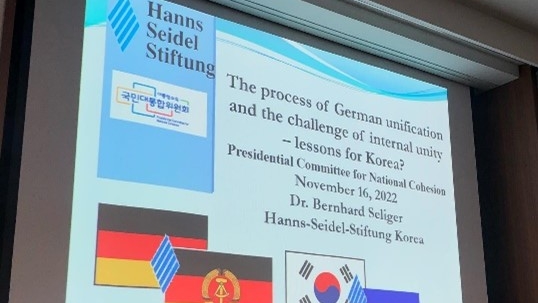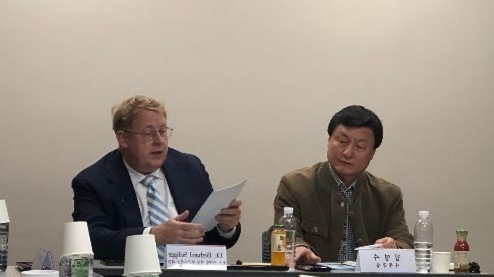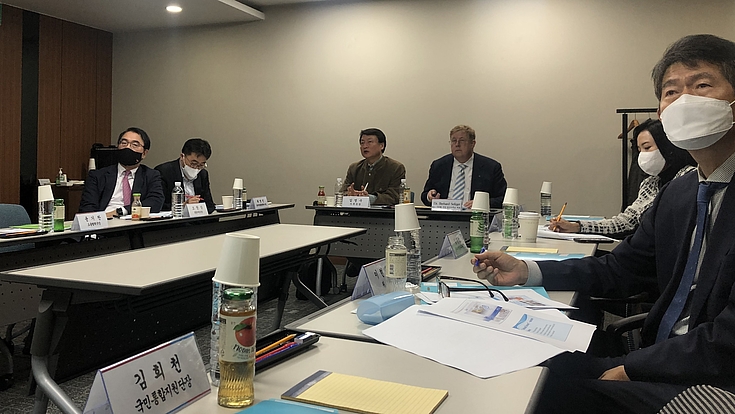Seminar
Presentation on “The process of German Unification and the Challenge of Internal Unity- lessons for Korea” for the Presidential Committee for National Cohesion in Korea.

On November 16th, 2022, Dr. Bernhard Seliger held a presentation on “The process of German Unification and the Challenge of Internal Unity- lessons for Korea?” for the Presidential Committee for National Cohesion in Korea with simultaneous interpretation by Mr. Young-Soo Kim of HSF. He gave insights into the process of German unification from a German point of view, answered questions on the developments and current status, and impact of the unification. In particular, he explained the steps Germany has taken to enable reunification and integration, from which lessons and possible ideas for South Korean policy emerge.

Dr. Seliger started his presentation by giving an overview of German unification, starting with an explanation of the initial conditions in East Germany. He touched upon the Economic problems of Socialism, Privatization at this time, and its problems, as well as the results of convergence, illustrated by some figures and data. The data compared developments in East and West Germany shortly after the reunification, not only looking at economic factors but also social indicators. The next topic, industrial policies, and industrial development gave a macro-view on transfers for the reconstruction of the East German economy. It included regional policies, depicted the curve of the economic recovery of the East utilizing data such as transfer balances between different regions, and mentioned fiscal solidarity. Continued challenges until today, such as the migration from the East and the death of the East German countryside, were presented to the audience as well. In the following, Dr. Seliger touched upon infrastructure renewal after 1990 and cost estimates of the unification from the 1990s until now. Toward the end of his presentation, he shared his thoughts on unification lessons that Korea could derive from the German case. He highlighted the difficulties in applying the German unficiation case to Korea since there are many differences in regard to geo-politics, technology, ideology, political culture etc. On that note, he introduced pre-unification lessons to be of more importance for Korea by now. He described the environment in East Germany to have been much freer and more open to frequent meetings and for a realm of private, non-political exchange due to the historical background. On this note, he spoke about the topic of private cooperation as the usually overlooked dimension, also mentioning examples of private cooperation through post and telecommunication such as West packages to the East. As a post-unification lesson, Dr. Bernhard Seliger especially mentioned social unification which he considered the largest challenge resulting in long-term political and economic challenges. Furthermore, he stressed the importance to clear common misunderstandings about Germany’s unification. The presentation covered the triggers of East-West cooperation including ideological, political, and economic interests and approaches on how to draw a comparison to the Korean situation. Dr. Seliger ended the presentation by introducing his opinion to the audience on what Korea should learn from the German unification case, stating that above all, a South Korean consensus is necessary first.

HSF is thankful for the lively participation in the closing Q&A session in which various questions were raised, especially on the unification procedure. The audience has shown great interest and requested more detailed information on the solidarity tax, the German population‘s take on it, and how the transfer balances between different German regions worked. Additionally, it was discussed if Covid affected the path to unification and could prospectively become a game changer. Another question concerned North Korean foreign affairs and how they differ from the foreign policies which the GDR followed. In regard to the young generation, it was questioned whether the attitudes towards the unification of Germans and Koreans are similar or different. Finally, the Presidential Committee asked Dr. Seliger to give suggestions on which policies the Korean government should follow and which approach he would suggest.
